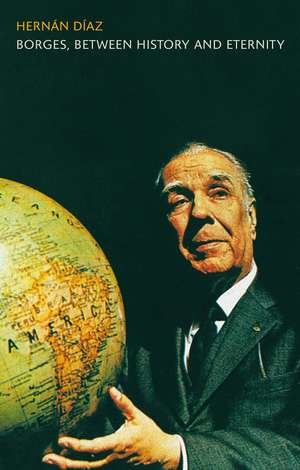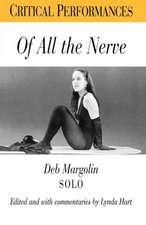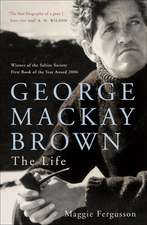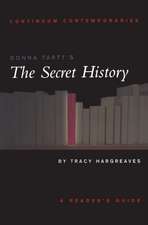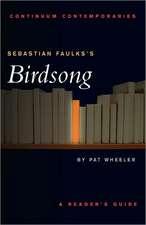Borges, between History and Eternity
Autor Dr Hernan Diazen Limba Engleză Paperback – 3 oct 2012
| Toate formatele și edițiile | Preț | Express |
|---|---|---|
| Paperback (1) | 190.06 lei 6-8 săpt. | |
| Bloomsbury Publishing – 3 oct 2012 | 190.06 lei 6-8 săpt. | |
| Hardback (1) | 712.06 lei 6-8 săpt. | |
| Bloomsbury Publishing – 3 oct 2012 | 712.06 lei 6-8 săpt. |
Preț: 190.06 lei
Preț vechi: 221.76 lei
-14% Nou
Puncte Express: 285
Preț estimativ în valută:
36.37€ • 38.89$ • 30.32£
36.37€ • 38.89$ • 30.32£
Carte tipărită la comandă
Livrare economică 18 aprilie-02 mai
Preluare comenzi: 021 569.72.76
Specificații
ISBN-13: 9781441197795
ISBN-10: 1441197796
Pagini: 208
Dimensiuni: 138 x 216 x 15 mm
Greutate: 0.27 kg
Ediția:New.
Editura: Bloomsbury Publishing
Colecția Continuum
Locul publicării:New York, United States
ISBN-10: 1441197796
Pagini: 208
Dimensiuni: 138 x 216 x 15 mm
Greutate: 0.27 kg
Ediția:New.
Editura: Bloomsbury Publishing
Colecția Continuum
Locul publicării:New York, United States
Caracteristici
Assesses Borges' influence upon writers as diverse as Pynchon, Calvino, Amis, Foucault and Foster Wallace
Notă biografică
Hernan Diaz is Managing Editor of Revista Hispánica Moderna and Associate Director of the Hispanic Institute at Columbia University, USA. Formerly he has been a professor at the University of Buenos Aires, Argentina, and the State University of New York (Albany), USA.
Cuprins
Foreword South, North, Beyond I. POLITICAL THEOLOGY Introduction 1. God and Country 2. When Fiction Lives in Fiction II. THE UNITED STATES OF AMERICA Introduction 1. Edgar Allan Poe (On Murder Considered as Metaphysics) 2. Walt Whitman, an American, a Kosmos Afterword El vaivén Note on the TranslationsAbbreviation of Borges's TitlesWorks CitedAcknowledgements
Recenzii
A splendid book. Intelligent, illuminating, original, worthy of its ambitious subject. I have read it with increasing pleasure, and finished it feeling I now had a better understanding of Borges's seemingly simple and apparent, but in fact deeply mysterious intelligence.
The arena of Borges criticism is a crowded firmament and some of its stars are very dim indeed; by mediating two hardline critical positions, Díaz's book adds to the luster and depth of the field.
Just when all seemed lost, Borges, Between History and Eternity proves there's still life in the Borges studies galaxy. Life of the best kind, which in the world of literary criticism means precision, intellectual agility, microscopically close reading and, above all, the will to go against the grain of the most respected conventional wisdom. To dismantle the old dilemma of Borges studies-Borges, universal or local? Metaphysical or down-to-earth? Abstract or political?-Hernán Díaz exhumes a critical dagger that in his hands shines as though drawn for the first time: the chiasmus. Which is to say the swinging operation that requires crossing and interchanging the terms of an opposition that once seemed ironclad. Thus Díaz finds the Borges most engaged with history in his most conceptual texts, and the most conceptual Borges in those fictions most deeply rooted in national identity. History and eternity, as Díaz sees them in Borges, are no longer antithetical terms: they are poles linked by a healthy and diabolic reciprocal equivalence that can't help but disquiet us. To take a writer about whom we thought we knew everything and render him disquieting-what more can we ask from a book of criticism?
This book explores two aspects of the work of Argentine writer Jorge Luis Borges. The first part of the book examines the relationship between politics and metaphysics in some of Borges' works. The second part analyses how two American writers, Edgar Allan Poe and Walt Whitman, figure into Borges's oeuvre. Additionally, the book discusses Borges's influence on some North American writers - for example, Thomas Pynchon and John Barth. Diaz (Columbia Univ.) wants to show how Borges's metaphysical discussions have, to a large extent, political connotations, and conversely, how his historical and social concerns are informed and influenced by metaphysical ideas. The study aims to reveal that the most common ("framed") literary structure in Borges's fiction, one that encapsulates another fiction inside another one, and so on, has political connotations: power consists in imposing fictions as realities. Valuable for anyone interested in Borges, this book includes an excellent up-to-date bibliography and a detailed index. Summing Up: Highly recommended. Upper-division undergraduates, graduate students, faculty.
Borges, between History and Eternity is a meticulously argued, intelligent and expertly articulated reading of Borges. It offers an important addition to Borges criticism, and should be valued as such.
The arena of Borges criticism is a crowded firmament and some of its stars are very dim indeed; by mediating two hardline critical positions, Díaz's book adds to the luster and depth of the field.
Just when all seemed lost, Borges, Between History and Eternity proves there's still life in the Borges studies galaxy. Life of the best kind, which in the world of literary criticism means precision, intellectual agility, microscopically close reading and, above all, the will to go against the grain of the most respected conventional wisdom. To dismantle the old dilemma of Borges studies-Borges, universal or local? Metaphysical or down-to-earth? Abstract or political?-Hernán Díaz exhumes a critical dagger that in his hands shines as though drawn for the first time: the chiasmus. Which is to say the swinging operation that requires crossing and interchanging the terms of an opposition that once seemed ironclad. Thus Díaz finds the Borges most engaged with history in his most conceptual texts, and the most conceptual Borges in those fictions most deeply rooted in national identity. History and eternity, as Díaz sees them in Borges, are no longer antithetical terms: they are poles linked by a healthy and diabolic reciprocal equivalence that can't help but disquiet us. To take a writer about whom we thought we knew everything and render him disquieting-what more can we ask from a book of criticism?
This book explores two aspects of the work of Argentine writer Jorge Luis Borges. The first part of the book examines the relationship between politics and metaphysics in some of Borges' works. The second part analyses how two American writers, Edgar Allan Poe and Walt Whitman, figure into Borges's oeuvre. Additionally, the book discusses Borges's influence on some North American writers - for example, Thomas Pynchon and John Barth. Diaz (Columbia Univ.) wants to show how Borges's metaphysical discussions have, to a large extent, political connotations, and conversely, how his historical and social concerns are informed and influenced by metaphysical ideas. The study aims to reveal that the most common ("framed") literary structure in Borges's fiction, one that encapsulates another fiction inside another one, and so on, has political connotations: power consists in imposing fictions as realities. Valuable for anyone interested in Borges, this book includes an excellent up-to-date bibliography and a detailed index. Summing Up: Highly recommended. Upper-division undergraduates, graduate students, faculty.
Borges, between History and Eternity is a meticulously argued, intelligent and expertly articulated reading of Borges. It offers an important addition to Borges criticism, and should be valued as such.
Descriere
Considers the intersection of aesthetics, politics and metaphysics in Borges's texts, and analyzes their interaction with the North American canon.
